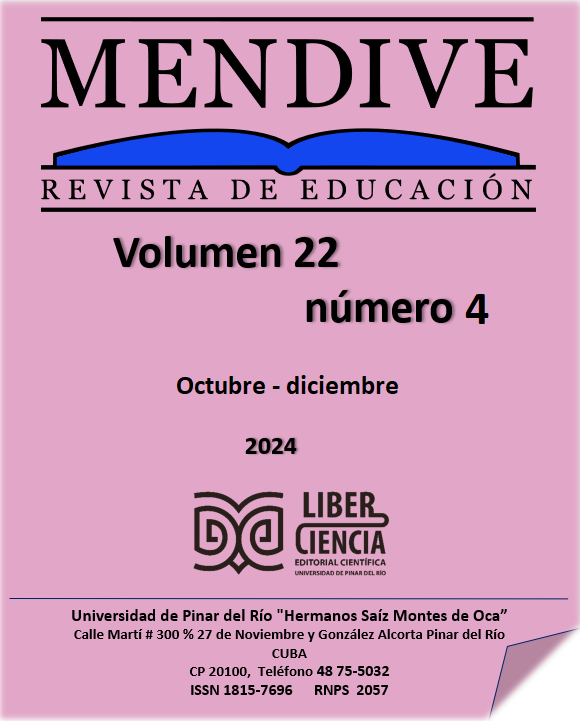Evaluating the impact of vocational training on students of non-pedagogical university courses
Main Article Content
Abstract
This article is based on the need to evaluate the impact of vocational training on education professionals, specifically on university professors of university courses. The objective was to offer a methodology for evaluating the impact of vocational training on students of non-pedagogical university courses, based on the investigative-certificate method of evidence of impacts from a teaching-learning dimension, socio-laboral linkage, scientific-technical and methodological preparation and the performance of the subjects. Quantitative pre-experimental research was carried out using the methods of analysis, synthesis, system approach, observation and the chi-square statistic that allowed to verify the existence of favorable impacts on higher education professionals working in non-pedagogical courses. The study concludes by stating that the methodology provided contributed to improving the performance of higher education professionals (teachers) in the evaluation of the objective or distorted effects that occur in the process and result of the vocational training of students in non-pedagogical university courses for decision-making for their continuous and systematic monitoring. The methodology can be applied in all universities, in business contexts and in universities that train health professionals with the relevant adjustments.
Downloads
Article Details

This work is licensed under a Creative Commons Attribution-NonCommercial 4.0 International License.
References
Aguilar, V., González Y. A (2023). La formación profesional: universidad-entidad laboral. Tareas durante el proceso evaluación. En T. Y. Cala Pegueros & P. Gougoulakis (Eds), Habilidades profesionales, competencias y formación para el emprendimiento (pp 6-22). LiberCiencia. http://rc.upr.edu.cu/jspui/handle/DICT/4124
Alonso, L. A., Leyva, P. A. y Mendoza, L. L. (2019). La metodología como resultado científico: alternativa para su diseño en el área de ciencias pedagógicas. Revista Opuntia Brava, 11 (Especial 2), 231-247. http://opuntiabrava.ult.edu.cu/index.php/opuntiabrava/article/view/915
Alonso, L. A.; Cruz, M. A., Olaya, J. (2020). Dimensiones del proceso de enseñanza - aprendizaje para la formación profesional. Revista Luz, 19 (2), p. 17-29, http://luz.uho.edu.cu/index.php/luz/article/view/1032
Ávalos, R. y Del Huerto, M. E. (2021). Desarrollo histórico de la evaluación del impacto de la formación de especialidades médicas en Cuba. Revista Médica Electrónica, 43 (2), 3147-3158. http://scielo.sld.cu/scielo.php?script=sci_arttext&pid=S1684-18242021000203147&lng=es&tlng=es
Baker, J. L. (2020). Evaluación del impacto de los proyectos de desarrollo en la pobreza: manual para profesionales. Washington: Banco Mundial. http://www.bivipas.unal.edu.co/handle/10720/514
Berner, H. H., Darville, P., Guzmán, N., Montoya, A. M. y Izquierdo, S. (2015). Metodología de la evaluación del impacto. Santiago. CHILE: División de Control de Gestión. I Jornada de Doctores en Ciencias de la UCMH 2015. http://doccien2015.sld.cu/index.php/2015/2015/paper/view/34/17
Centelles, J. S., Domínguez, I. y Ávila, E. R. (2019). La evaluación del impacto de la formación laboral de los estudiantes en las carreras pedagógicas. Revista Caribeña de Ciencias Sociales. https://www.eumed.net/rev/caribe/2019/07/impacto-formacion-laboral.html//hdl.handle.net/20.500.11763/caribe1907impacto-formacion-laboral
García, K. A., Ortiz, T. y Chávez, M. D. (2021). Relevancia y dominio de las competencias digitales del docente en la educación superior. Revista Cubana de Educación Superior 40 (3). http://scielo.sld.cu/scielo.php?script=sci_arttext&pid=S0257-43142021000300020&lng=es&tlng=es
García, A., Villa, A., Aláez, M. y Romero, S. (2022). Aplicación y resultados de un sistema para evaluar la calidad de la docencia universitaria en una década de experimentación. Revista de Investigación Educativa, 40(1), 51-68. http://dx.doi.org/10.6018/rie.401221
Gaviria, D. y Valencia, A. (2019). Percepción de la estrategia aula invertida en escenarios universitarios. Revista Mexicana de Investigación Educativa 24 (81). http://dialnet.unirioja.es/servlet/articulo?codigo=7135277
Hernández, R., Fernández, C. y Baptista, P. (2014). Metodología de la investigación. (5ta Ed.), Edamsa impresiones S.A. de C.V. http://www.esup.edu.pe/descargas/dep_investigacion/Metodologia%20de%20la%20investigaci%C3%B3n%205ta%20Edici%C3%B3n.pdf
Hernández, Y, Hernández, V. J., Edenia, N. y Tejeda, E. (2017). ¿Chi cuadrado o Ji cuadrado? Revista Medicentro Electrón. 21(4), 294-96. http://scielo.sld.cu/pdf/mdc/v21n4/mdc01417.pdf
Juca, F., Carrión, J. y Juca, A. (2020). B-learning y Moodle como estrategia en la educación universitaria. Revista Conrado 16 (76), pp. 215-220. http://scielo.sld.cu/scielo.php?script=sci_arttext&pid=S1990-86442020000500215&lng=es&tlng=es


